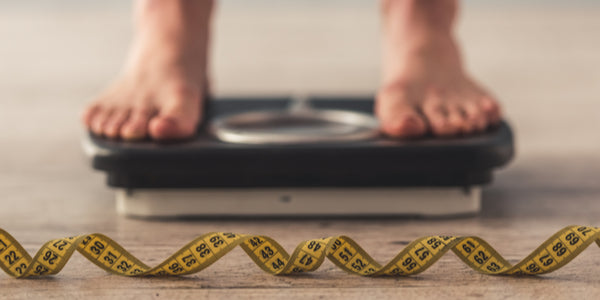
When hunger strikes, even the most strict and disciplined of people can be tempted to toss their diets overboard. No matter how planning-centric you might be, there are many reasons why hunger hits, and hits hard.
First, it's important to distinguish between hunger and appetite. Hunger is an actual, physiological, human reaction. This is when your stomach "growls" as a result of producing acid to prepare for food. Hunger is part of our survival, and most any food can satiate hunger for a time. When you are hungry, any food looks good.
So if hunger is physical, appetite is psychological. Appetite is in our heads. Appetite is specific. Only a certain food will satisfy our appetite. It's associated with food habits, for example - let's say you go to the movies. You've just had dinner, so you are probably not hungry, but you still might have an appetite for popcorn. Appetite is psychological, and results from our brain making an associate between foods and activities or habits. These patterns arise from childhood, and can be difficult to unlearn. And yet, unlearning habits is absolutely possible with practice.
So when you are looking for something to eat- first ask yourself, "Is this real hunger, or is it just my appetite?"
There are other reasons why you are always hungry, and this happens as a result of a balanced interplay of hormones and nutrients like carbohydrates, protein, and fat. Some foods will make you hungrier in a couple of hours than other foods. For example, a high-sugar or high-carbohydrate meal like cereal and milk, will cause your blood sugar to rise rapidly, and as a result your body will quickly release a lot insulin. After a couple of hours, most of that blood sugar will be entering cells, leaving you hungry again.
On the other hand, a breakfast that is higher in protein - such as a vegetable omelet - will not cause a spike in blood sugar, and only a very small amount of insulin will be released. Digesting a meal that contains protein takes a little longer, so you won't be hungry so soon. Protein ranks highest on the satiety scale, which means it makes you feel full, and feel full for longer than carbohydrates, fat, and even fiber.
So if you've already swapped your breakfast to one that contains protein and are still feeling hungry, don't worry – there are plenty more reasons why you are always hungry.
1. Not enough protein.
Protein is paramount when it comes to satisfying your hunger. Protein is a mainstay of the body - it can't produce it like it can carbohydrates, sugars, and fat. Protein - and the amino acids that comprise protein - is essential. When you haven't achieved your daily intake needs for protein &- your hunger will let you know it.
2. Eating too fast.
For most people, it takes 22 minutes for hunger hormones to travel to brain, signaling that you've been fed. If you eat super fast - which you can judge based upon how long other people are still eating after you finish - then you might not have allowed fed hormones enough time to travel to your brain to signal that you are full. This is a huge part of why second and third trips to the buffet seem like a good idea at the time, but end up leaving you overstuffed and overfed.
3. Hunger hormones.
Another reason why you are always hungry might be related to hunger hormones. Grehlin is a hormone responsible for your stomach growling – it is released and increases stomach acid production to prepare for food intake. Grehlin is usually released in higher amounts following exercise. On the other hand, leptin is a fed-state hormone, and higher amounts of stored body fat and reduced hunger are associated with leptin. The problem is - some people have leptin resistance, which mean their body doesn't signal that their fat stores are full, and their hunger is not reduced.
4. Eat smaller, more frequent meals.
It's not a good idea to save up all your calories for the evening – as this slows your metabolism throughout the day. If you are always hungry, try to eat every 2-3 hours, and it's best to choose a food that contains protein, like nuts or a cheese stick. Set an alarm to help you remember if you are prone to forget to eat snacks.
5. Psychological hunger.
For some people, their reaction to stress is to eat. When fight-or-flight stress hormones are in your system, one of the after-effects is to eat to recover from the stressful events. This is a primal reaction – after running from a bear, those hormones might cause you to be hungrier later, which is a survival instinct. The only problem is – in our modern society, we don't ever actually run from the bear. Instead we are sitting at our desks or driving our car. So we burn fewer calories than our ancestors might have, and then we are hungrier after as well.
6. Mistaking thirst for hunger.
Many of us have trouble distinguishing between hunger and thirst. One sign that you are hungry instead of thirsty would be if you are craving fruit – which has a very high water content. You might actually be thirsty, not hungry. So when your next craving hits – grab a bottle of water, or a club soda - and then wait 10 minutes. If your 'hunger' goes away, it was probably thirst all along.
7. Not enough fiber.
Fiber is the all-helpful hunger fighter for two reasons. First, fiber will help distend and expand your stomach after eating and physically make you feel fuller. Second, fiber doesn't contain calories – your body doesn't digest most of the fiber that you eat. Instead, this fiber will feed healthy bacteria and soak up cholesterol inside your digestive tract, so that it can be eliminated. If you are curious why you are always hungry, try tallying up your fiber intake for a single day – and see if you are getting the recommended 25g per day for women, or 38g per day for men.
8. Blood sugar that spikes and drops.
When your blood sugar drops lower than normal, it can cause your mood to change, increase feelings of fatigue, and result in mental sluggishness. It can also increase your desire for specific foods that will bring your blood sugar back up quickly. Foods that increase blood sugar quickly include sugar-sweetened beverages, and processed foods like cookies, sweets, candy, potato chips, and crackers. The problem is – these foods typically will leave you hungry again in a couple of hours. Choosing a snack that contains protein instead can help fend off hunger for a longer period of time and helps to prevent blood sugar spikes.







